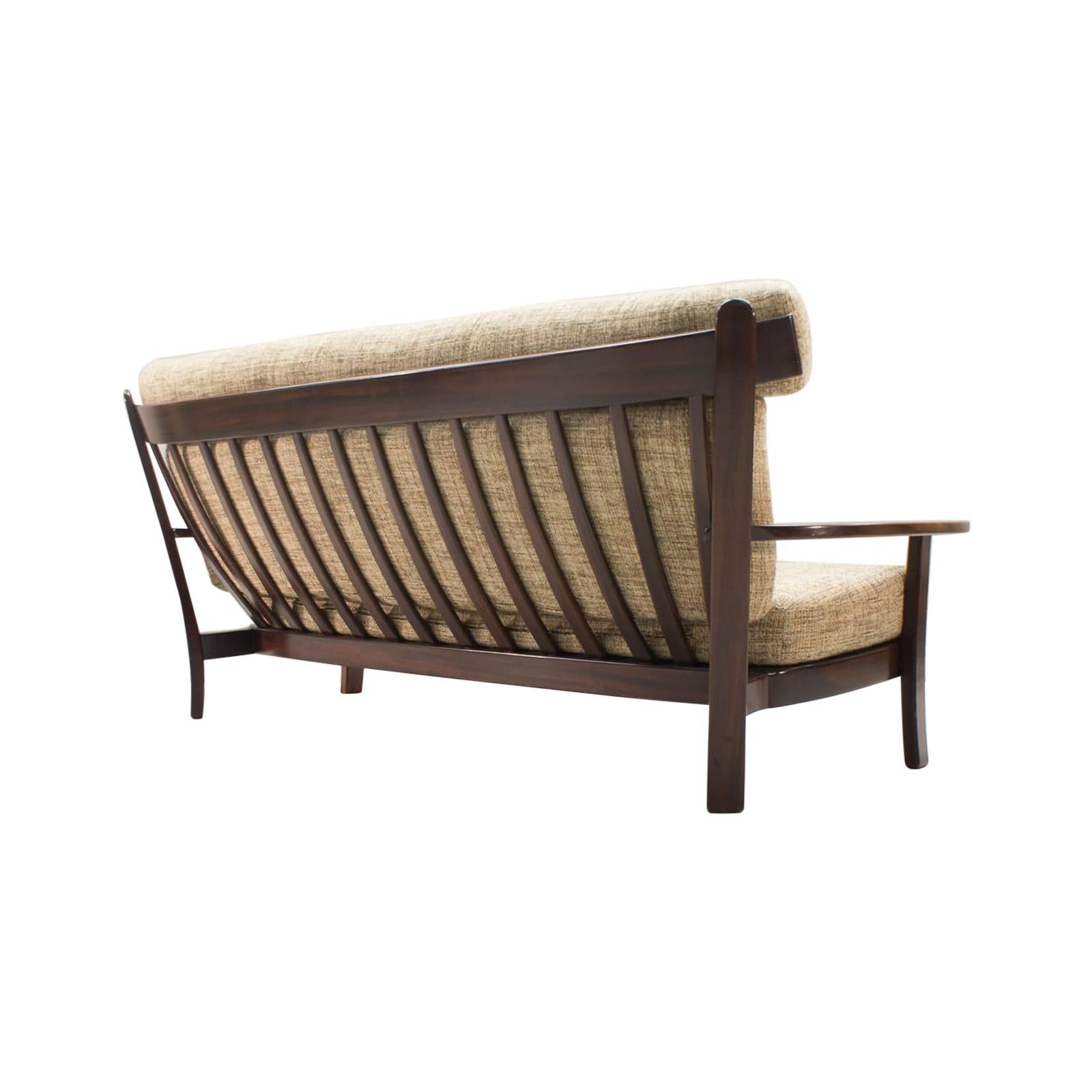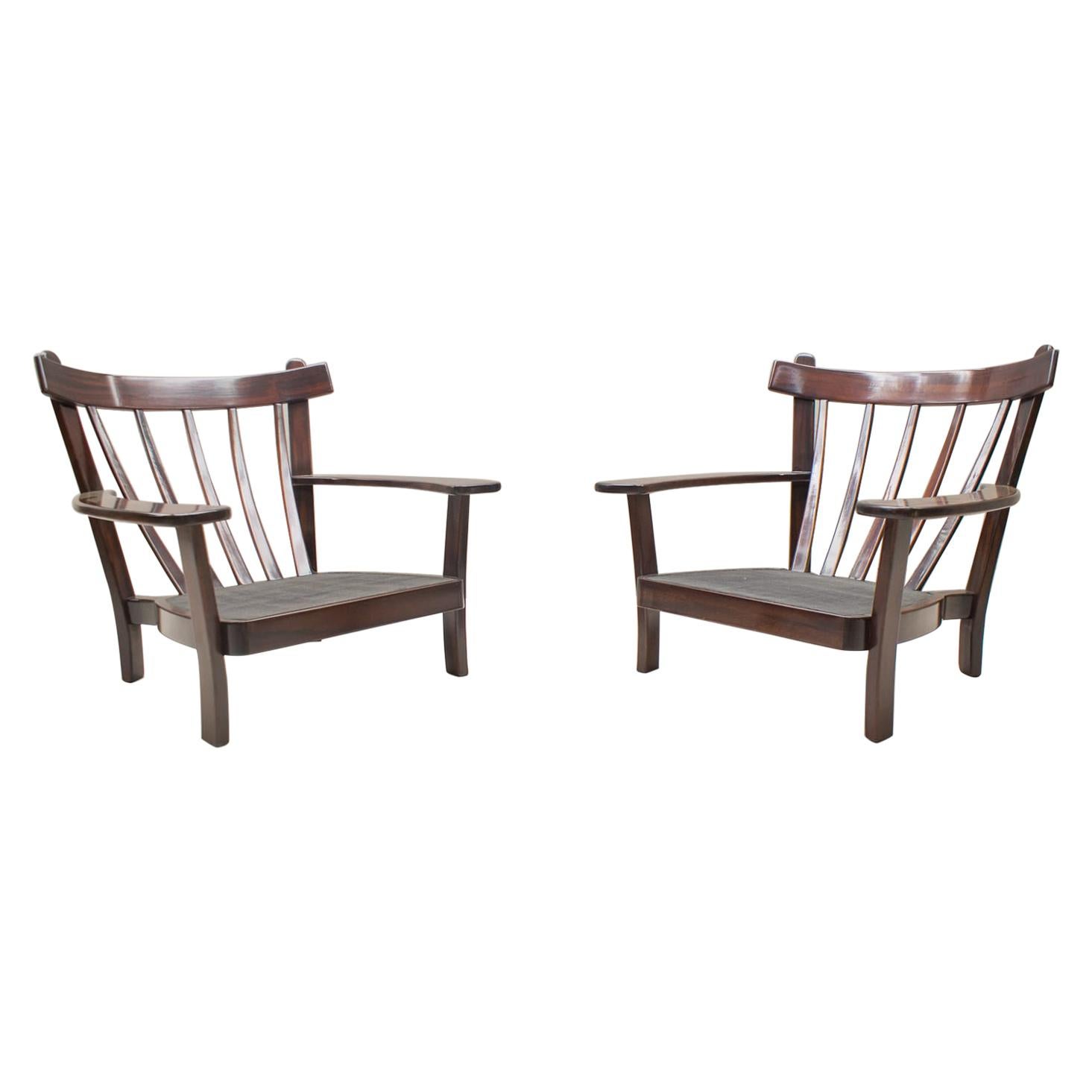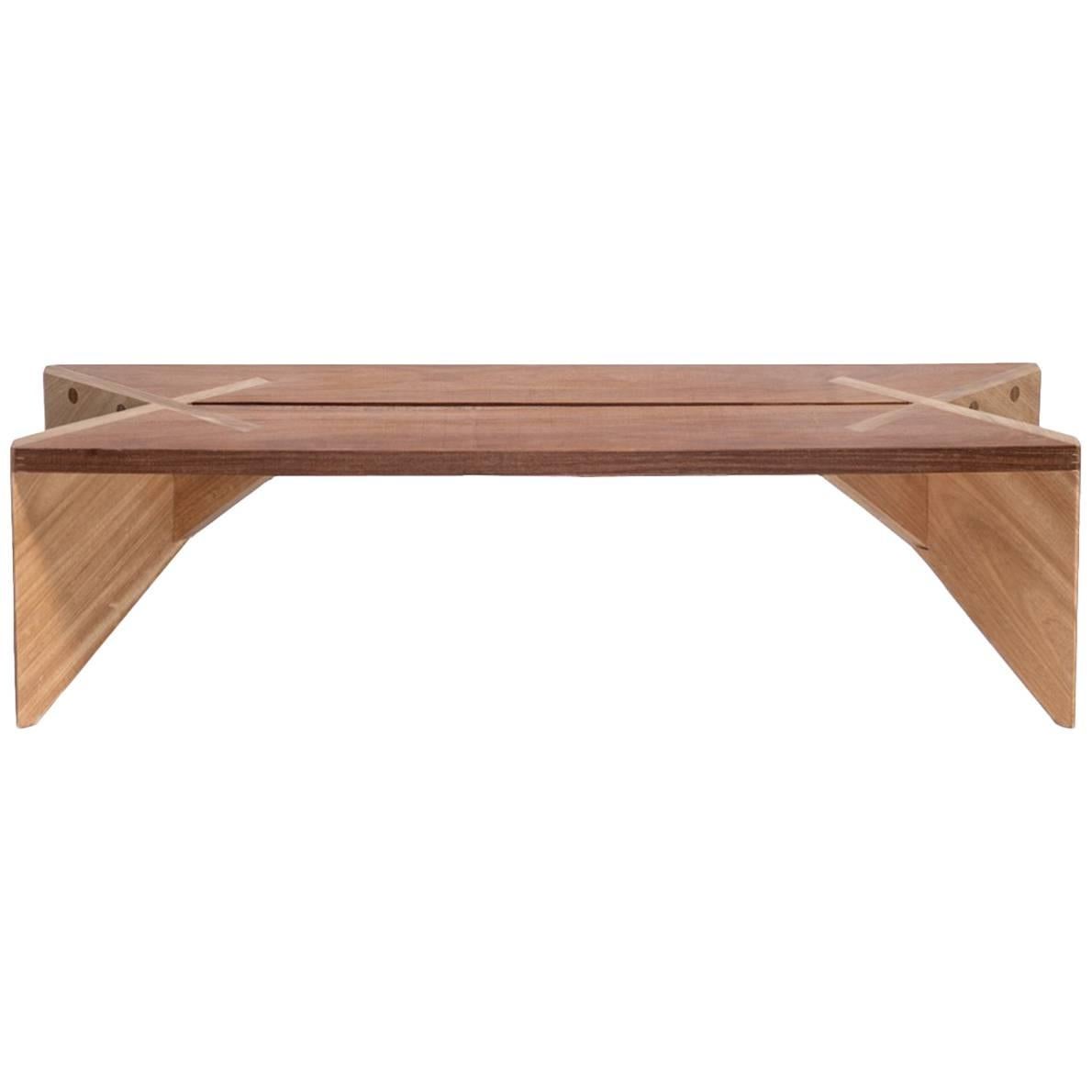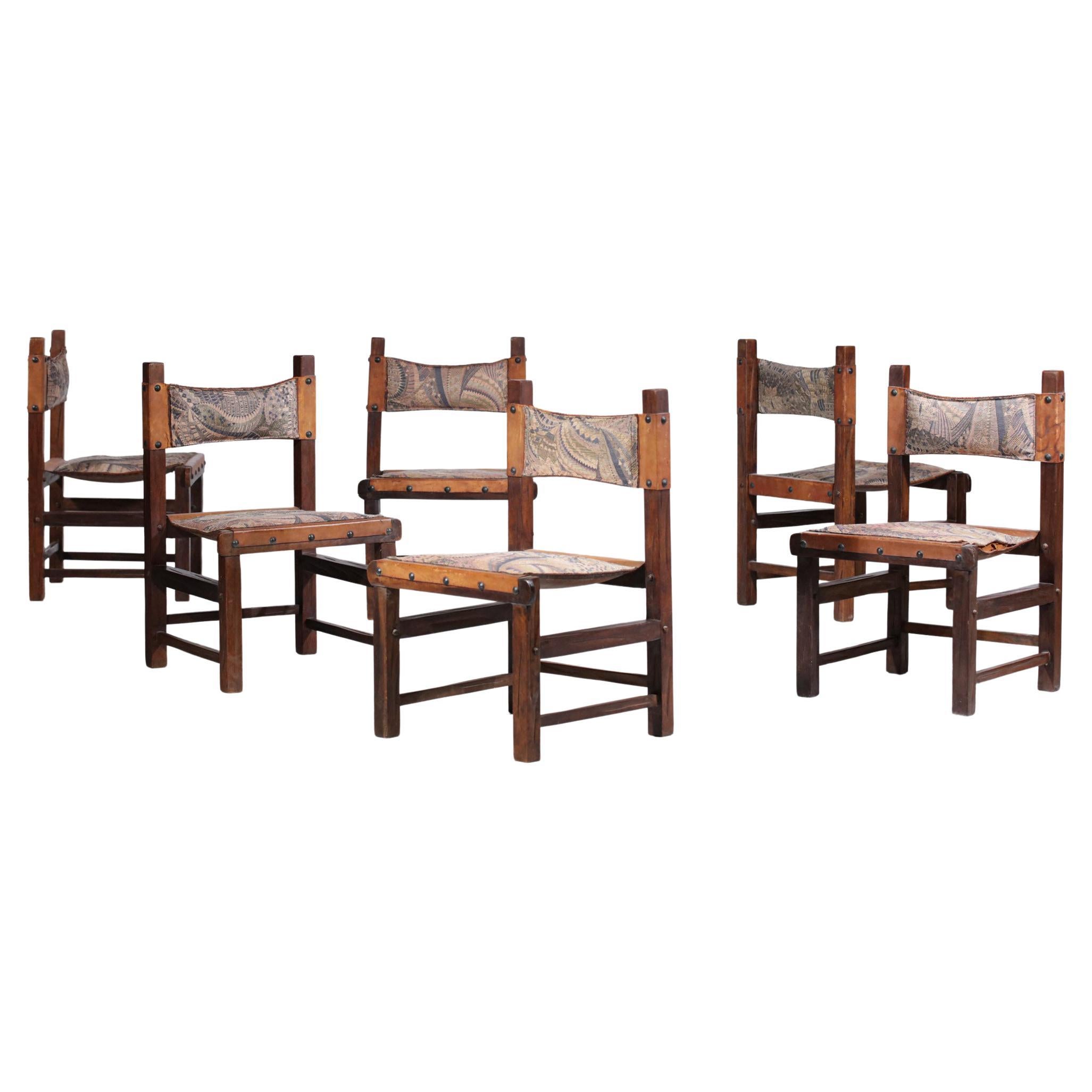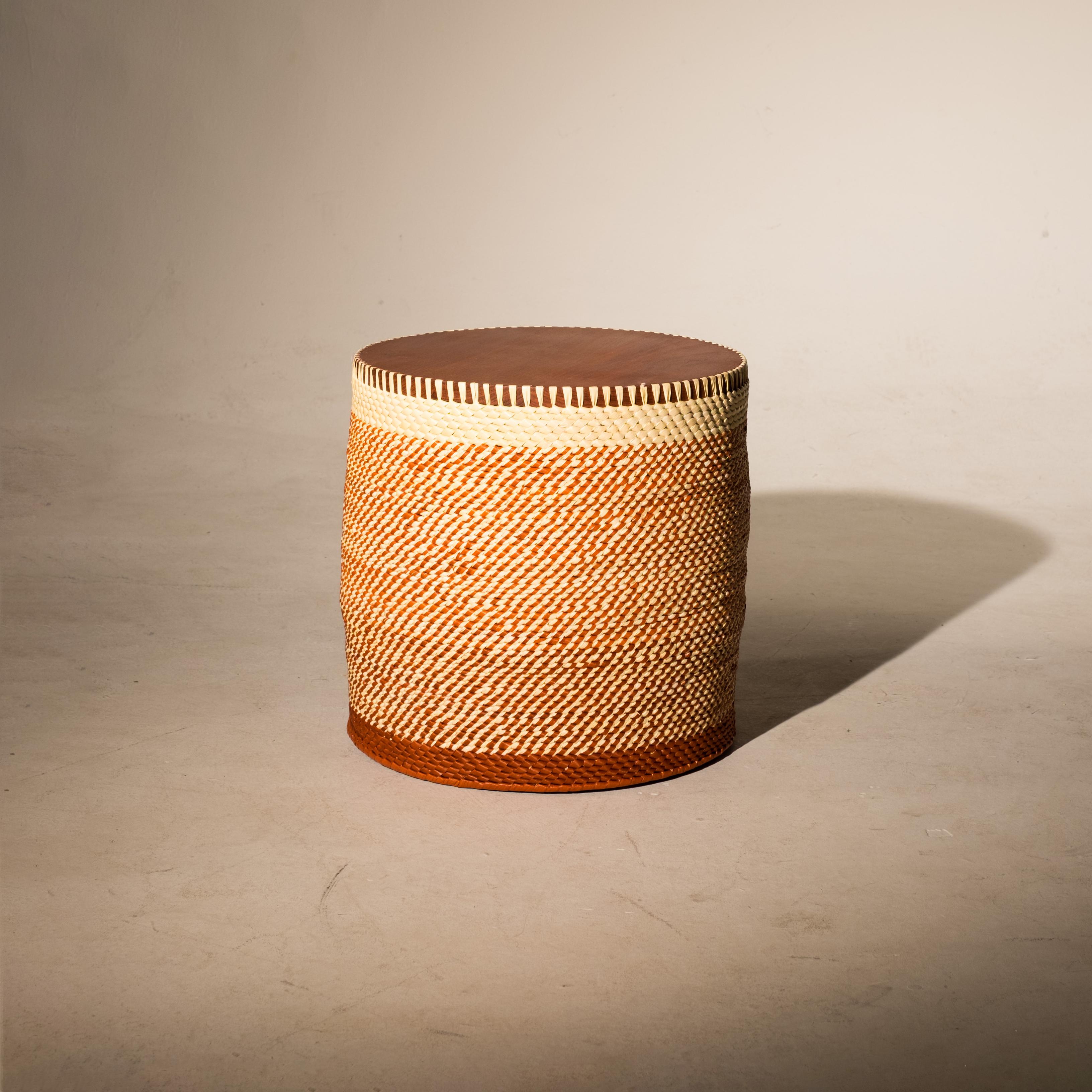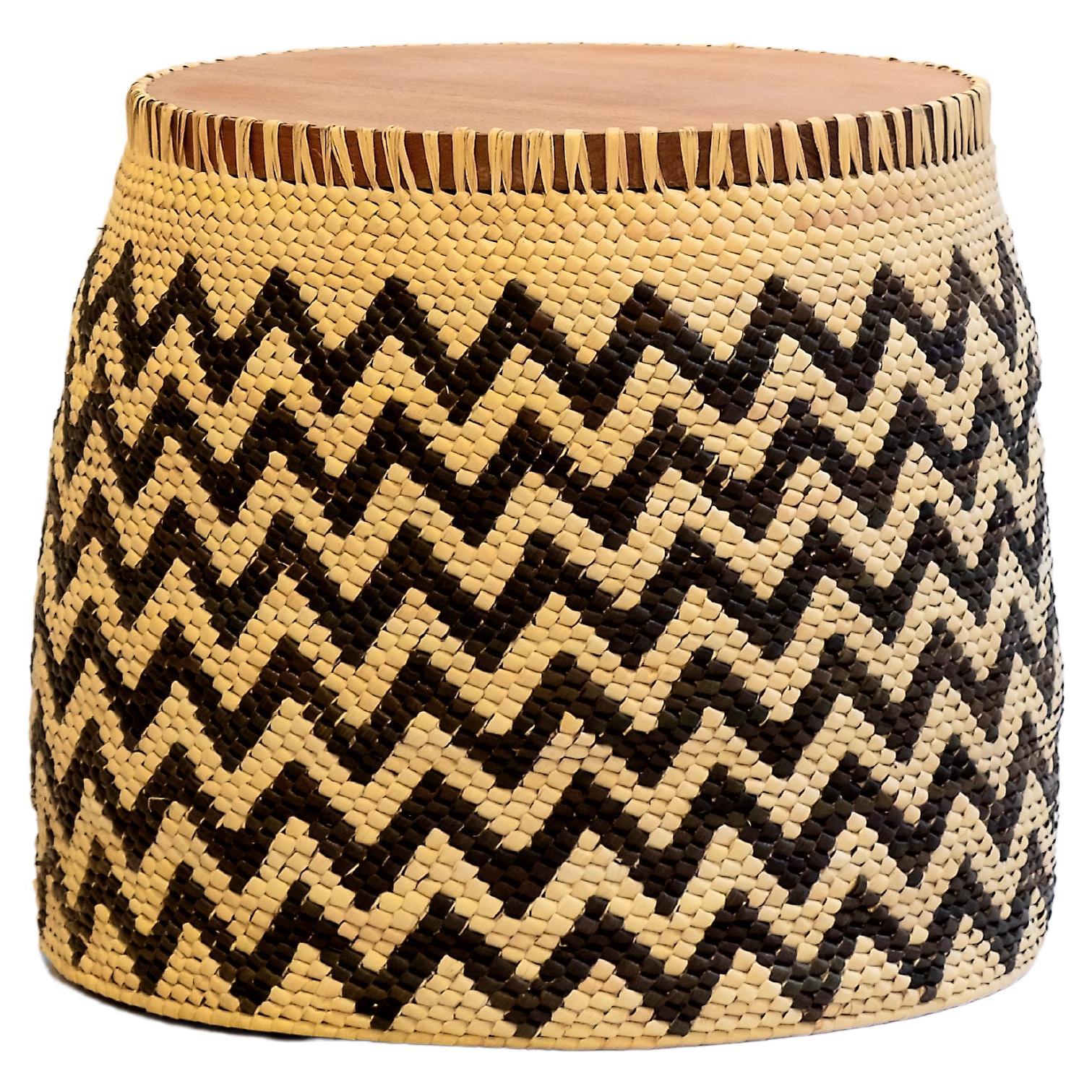Items Similar to Kaupüna Swing: handcrafted in the Xingu Indigenous Territory, Brazil
Video Loading
Want more images or videos?
Request additional images or videos from the seller
1 of 14
Kaupüna Swing: handcrafted in the Xingu Indigenous Territory, Brazil
About the Item
Completely executed in the Kaupüna Village, located in the Xingu Indigenous Reserve, Kaupüna Swing unites the design of Maria Fernanda Paes de Barros and the indigenous handicraft tradition of the Mehinako people.
Its design rises from the desire to highlight the buriti yarn, made by women, placing it in balance with the painted solid wood traditionally made by men and already with recognized value.
It brings together the artisanal work of Mehinaku women who harvest, clean, and prepare the buriti straw to make the thread with which they weave their traditional nets, and of Mehinaku men who enter the forest to find trees from which to take the wood to create zoomorphic benches adorned with charcoal and annatto-based graphics.
The Kaupüna Swing marks the first time in Kaupüna village that men and women worked together to create a single piece, what gives it an immeasurable value and meaning.
Developed in partnership with Kulikyrda Mehinaku and Kuyawalu Aweti, it was considered by them a "new indigenous product".
It is part of Yankatu's Xingu collection. To create it Maria Fernanda Paes de Barros researched the Mehinaku traditions, visited Kaupüna village for a short period of time before the pandemic and went through numerous immersions with the local artisans online.
As all the pieces produced by Yankatu, it is accompanied by its soul, a certificate of authenticity in the form of a small book that tells about the inspiration that gave birth to it and leaves blank pages so that its story can continue to be told by those who acquire it, turning it into something more, which does not change with fashion, which does not go by with time. To the contrary, it will move on from a generation to another, from hand to hand, each time with more stories to tell, each time incorporating the lives shared by it.
It is amazing how vision, after immersive experiences in ancestral cultures, begins to have a greater sensitivity to see new ways of bringing our origin to the contemporary world. It is along this path that Maria Fernanda Paes de Barros, artist, researcher and founder of Yankatu, travels. With her soul absorbed by the profound experiences of the places she goes through, Maria Fernanda, in her own way, captures a dose of each learning experience, bringing to surface revelations in form of pieces filled with value, as a manifest for the benefit of Brazilian identity. “Each trip I make, I become humbler, I perceive differences from new angles, relearning to see and understand meanings through the other's place”, explains the artist.
For the new Xingu Collection, process could not be different; however, it had unusual circumstances in its development. The collection arose from the encounter between Maria Fernanda and the Mehinako ethnicity, located in the Kaupüna village, in Upper Xingu, south of Amazon Forest, at the end of last year. “Xingu is born from an encounter between past and future, but is established in the present, proposing new ways of looking at tradition, with the respect and admiration that it deserves, while using technology to maintain communication in times of isolation ”, says Maria Fernanda, who, due to new practices since the beginning of pandemic in the world, was unable to return to Kaupüna village to continue the studies and production process.
This unprecedented protocol in the dynamics made Maria Fernanda find new ways of interacting with the village artisans. The weaving techniques classes that she would have in loco were transformed into recorded videos and sent over the internet; with the help of Kulikyrda Mehinako, an artist and one of the community representatives, Maria Fernanda developed a new color chart, extracted from leaves and barks of native trees found in the reserve, with the aim of rescuing the full potential of Xingu, counting on Maibe Maroccolo, in Brasília, to extract these shades and make dye pigments to color the cotton threads used on the mats produced by the Kaupüna village’s women.
The wood comes from nature, each one is unique, with its veins, knots and tones. Because it is a natural material it suffers with the climate change, so cracks and shifts in color may emerge over time. The wood can also warp sometimes due to a large variation in relative humidity of the air. This aren’t defects on the contrary, all of this is considered normal.
The woven designs and painting are creations of the Mehinaku people based on their traditional graphics. Measurements may vary slightly depending on the wood found in the forest.
The images in the photos are illustrative, as the creation in the village is free and the designs and color combinations can vary, which makes each swing always unique. If you want a particular color send us a message and we will be happy to check the possibility.
The work is accompanied by a certificate of authenticity.
Brazilian Contemporary and Collectible Design by Yankatu, design + art with Brazilian soul.
Exhibitions:
2022 – Amazonie Immersive – Talk Gallery – Brussels, Belgium
2022 – Passagens – Nós Gallery – São Paulo, SP, Brazil
2021 – Orgânico – Adolpho Bloch Square – São Paulo, SP, Brazil
Auctions:
2020 - Leilão Oficial Artesol - São Paulo, SP, Brasil
- Creator:Maria Fernanda Paes de Barros (Designer)
- Dimensions:Height: 78.75 in (200 cm)Width: 23.63 in (60 cm)Depth: 11.82 in (30 cm)
- Style:Other (In the Style Of)
- Materials and Techniques:
- Place of Origin:
- Period:
- Date of Manufacture:2020
- Production Type:New & Custom(Current Production)
- Estimated Production Time:16-17 weeks
- Condition:
- Seller Location:Jundiaí, BR
- Reference Number:1stDibs: LU3188121719492
Yankatu - design with soul
My motivation comes from my soul and flows openly, on my life and in my work. I love what I do and I do it with intensity, I live every moment and I transmit all this emotion. In each project I immerse myself deeply in the region, in their craft and in the lives of the people who make them, it is a dive governed by research and by my soul, guided by the heart, done with respect and with the rhythm dictated by time. I get transformed and provoke transformations, and these atitudes reflect in the surroundings and beyond. I believe that design and art are one of the ways to value and eternalize the ancestral knowledge of Brazilian traditional crafts and the importance of nature around us, and so I use all tools that I have to create a quilt of infinite possibilities, full of feelings. Through Yankatu I expose not only my work, I bring with me the dreams and works of the artisans and instigate new dreams too. The tangible part of this work are the pieces that intertwine my touch with the lives that share their moments with me. The other part, immeasurable, is in continuous development, in a mixture of art and freedom, with no date to finish. It is a continuous development, in a relationship created around respect and trust. My desire, to be able to do this as long as I live.
The colors of cotton threads can be custom-made to adapt to customer needs.
About the Seller
No Reviews Yet
Vetted Seller
These experienced sellers undergo a comprehensive evaluation by our team of in-house experts.
Established in 2015
1stDibs seller since 2017
17 sales on 1stDibs
- ShippingRetrieving quote...Ships From: Jundiaí, Brazil
- Return PolicyThis item cannot be returned.
More From This SellerView All
- Palafitas Stool: handcrafted in Brazil with tucumã straw and solid woodBy Maria Fernanda Paes de BarrosLocated in Jundiaí, SPPalafitas side table is made of Imbuia or cabreuva wood and bring the Tucumã straw, a typical palm of the Amazon rainforest, stained with roots, leaves and fruits, and braided by the...Category
2010s Brazilian Other Stools
MaterialsNatural Fiber, Wood, Straw
- Beijú Center Table: handcrafted in Brazil with beads and Cabreúva woodBy Maria Fernanda Paes de BarrosLocated in Jundiaí, SPThe Beiju Center Table is tribute to Mehinaku indigenous women. Made in Cabreúva wood it receives tiny beads necklaces made by them to be used in the traditional rituals of their people, in the Xingu Indigenous Territory, Mato Grosso, Brazil. All Mehinaku traditions move me. The exchange system called Moitará, through which exchanges between villages are made, allows women to purchase ceramic pieces that are placed over the fire, supported on three bricks, to prepare their typical food, the cassava beiju. This moment was also honored at Beiju Center Table, with its top carved in solid cabreuva balanced on "wood bricks", It is part of Yankatu's Xingu collection...Category
2010s Brazilian Other Center Tables
MaterialsWood, Beads
- Palafitas side table S: handcrafted in Brazil with tucumã straw and solid woodBy Maria Fernanda Paes de BarrosLocated in Jundiaí, SPPalafitas side table is made of Imbuia or cabreuva wood and bring the Tucumã straw, a typical palm of the Amazon rainforest, stained with roots, leaves and fruits, and braided by the...Category
2010s Brazilian Other Side Tables
MaterialsNatural Fiber, Wood, Straw
- Palafitas side table M: handcrafted in Brazil with tucumã straw and solid woodBy Maria Fernanda Paes de BarrosLocated in Jundiaí, SPPalafitas side table is made of Imbuia or cabreuva wood and bring the Tucumã straw, a typical palm of the Amazon rainforest, stained with roots, leaves and fruits, and braided by the...Category
2010s Brazilian Other Side Tables
MaterialsNatural Fiber, Straw, Wood
- Rococó Dresser: handcarved in Brazil in Red cedar woodBy Maria Fernanda Paes de BarrosLocated in Jundiaí, SPThis chest of drawers is made in solid pink cedar wood carved by the craftsman Rondinelly Santos, specialized in sacred art. The flowing design of the acanthus scrolls and leaves comes alive through the notch and runs through the five drawers of the dresser, uniting them subtly, creating an optical effect that makes the wood look soft. Entirely made of solid pink cedar, the dresser recovers, through the art of carving, the influence of the Rococo period in Brazil. Volutes, acanthus leaves and flower wreaths gracefully permeate the drawers, awakening our gaze and the desire to touch it. A multifunctional piece with a timeless design that values the Brazilian artisanal work. Carving wood is to transform it, rewriting its history through the hands. This is how each of the dressers in this limited series is born. In view of these characteristics all parts are numbered and produced to order. This is part of Yankatu's Artisans collection. To create them Maria Fernanda Paes de Barros researched the Brazilian colonial traditions in the historic city of Tiradentes, Minas Gerais. As all the pieces produced by Yankatu, is accompanied by its soul, a certificate of authenticity in the form of a small book that tells about the inspiration that gave birth to it and leaves blank pages so that its story can continue to be told by those who acquire it, turning it into something more, which does not change with fashion, which does not go by with time. To the contrary, it will move on from a generation to another, from hand to hand, each time with more stories to tell, each time incorporating the lives shared by it. The wood comes from nature, each one is unique, with its veins, knots and tones. Because it is a natural material it suffers with the climate change, so cracks and shifts in color may emerge over time. The wood can also warp sometimes due to a large variation in relative humidity of the air. This isn’t defects on the contrary, all of this is considered normal. The work is accompanied by a certificate of authenticity. Brazilian Contemporary and Collectible Design by Yankatu, design + art with Brazilian soul. The objects that appear in the pictures are not a part of the Rococo Dresser. Exhibitions: 2018 - Artisans, gold that emerges through the hands - Espaço Raízes - Tiradentes, MG, Brazil 2023 - Contemporary Craftsmanship: A Casa recebe a Semana...Category
2010s Brazilian Other Commodes and Chests of Drawers
MaterialsWood, Cedar
- Rococó Tray: handcarved in Brazil in Red cedar woodBy Maria Fernanda Paes de BarrosLocated in Jundiaí, SPThis tray is made in solid pink cedar wood hand carved by the craftsman Rondinelly Santos, specialized in sacred art, in Minas Gerais, Brazil The flowing design of the acanthus scro...Category
2010s Brazilian Other Serving Pieces
MaterialsWood, Cedar, Mirror
You May Also Like
- Large Brazilian Sofa in the Manner of Sergio Rodrigues, 1960sBy Sergio RodriguesLocated in Nürnberg, BayernSofa, rosewood, Brazilian design, European execution, 1960s. The sofa set is still in the original upholstery fabric. Altogether a very good condition. This settee is executed in ...Category
Vintage 1960s Brazilian Mid-Century Modern Living Room Sets
MaterialsFabric, Wood
- Two Large Brazilian Armchairs in the Manner of Sergio Rodrigues, 1960sBy Sergio RodriguesLocated in Nürnberg, BayernArmchairs, rosewood, Brazilian design, European execution, 1960s. The sofa set is still in the original upholstery fabric. Altogether a very good condition. This settee is execute...Category
Vintage 1960s Brazilian Mid-Century Modern Living Room Sets
MaterialsWood, Fabric
- Xingu Bench Brazilian Contemporary Design in Two HardwoodsBy Noemi Saga AtelierLocated in Sao Paulo, BRThis contemporary bench in hardwood is an interpretation of functionality and technical refinement of fittings and handmade wood joints, the origin of the Xingu bench design. The co...Category
21st Century and Contemporary Brazilian Other Benches
MaterialsWood
- Suite of 6 Brazilian Chairs from the 60s in Leather and Solid Wood F413Located in Lyon, FRSet of six Brazilian chairs from the 60s. Solid wood structure, back and seat in cognac leather covered with a geometric patterned fabric (bought in condition, fabric already present...Category
Vintage 1960s Brazilian Mid-Century Modern Chairs
MaterialsLeather, Wood
- Brazilian Rosewood Sofa by Celina Decorações, Midcentury Brazilian Design, 1960sBy Celina DecoracoesLocated in New York, NYThis sofa was produced by the Brazilian company Celina Decorações in the 1960s. The sofa is made of solid Rosewood, with seats and backs upholstered with a gorgeous fabric 100% Organ...Category
Vintage 1960s Brazilian Mid-Century Modern Sofas
MaterialsSilk, Rosewood
- Brazilian Rosewood Sofa by Celina Decorações, Midcentury Brazilian Design, 1960sBy Celina DecoracoesLocated in New York, NYBrazilian company Celina Decorações manufactured this sofa in the 1960s. The piece is composed of a solid Rosewood structure, with cushions upholstered with leather. This three-s...Category
Vintage 1960s Brazilian Mid-Century Modern Sofas
MaterialsLeather, Rosewood
